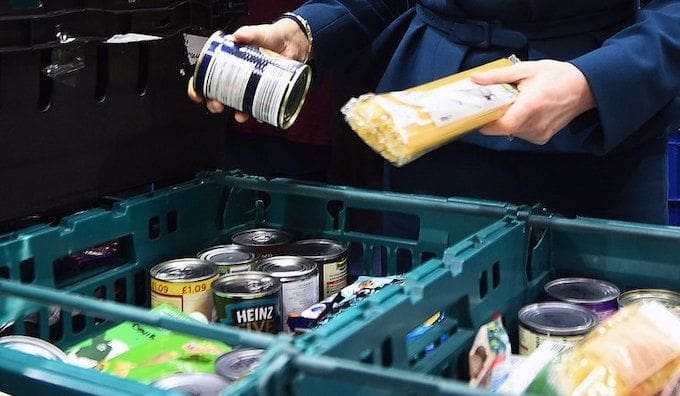Free ‘universal basic services’ has recently been advocated as a better alternative to a basic income, on the grounds that it would be a cheaper and more cost-effective way of combatting poverty.
On the premise that ‘essential services should be free at the point of need’, paralleling the National Health Service and state education, proponents have identified universal free ‘basic’ housing, free food, free local transport, free TV licence and a free ‘basic’ communications package including mobile phone and broadband internet. All of this, they claim, would cost £42 billion or about 2.3% of GDP.
We should be united in wanting more and better public services. But improving public services is not in opposition to providing a basic income. They would fulfil different needs and purposes. However, the proposals for ‘universal basic services’ (UBS) are not what they seem at first sight.
For a start, what is being proposed is not ‘universal’ in any accepted use of the word. For instance, the provision of ‘free food’ under the UBS banner is deceptive. According to the UBS scheme, the state would provide “one-third of the meals for the 2.2 million households deemed to experience food insecurity each year”. That is not universal. It is targeted. Identifying those suffering from food insecurity would necessarily imply means-testing or some complex test of ‘food insecurity’. As with all targeted schemes, many of those eligible would not be reached, while those receiving the free food would, as a result, face an even greater poverty trap and accompanying precarity trap than exist in the British welfare state today. The Department for Work and Pensions itself estimates that going from means-tested benefits into the sort of low-paid job claimants could obtain results in only a 20% increase in net income – a poverty trap of 80%. If they also lost ‘free food’, the net gain would be even less.
The proposal would also generate a new moral hazard. Someone deemed food insecure, and thus entitled to free meals, would have a disincentive to become food secure, unless the free food on offer was lousy (which could hardly be a policy objective, even though it is likely to be a policy outcome). That moral hazard would be accompanied by an equally perverse immoral hazard, since some people would have an incentive to become food insecure deliberately in order to claim free meals.
Providing ‘the poor’ with free food would extend the charity state and institutionalise the obnoxious system of ‘food banks’, which have mushroomed in the austerity era. The mass provision of free food would also risk more waste of food. However well-intentioned the charity state might be, people receiving free goods tend to value them less and treat them with less care than if they pay for them.
In practice, the choice of what food to make free would be arbitrary, based on paternalistic views of what is good for ‘the poor’ and what is not. Those countries that have implemented highly subsidised food have not had great success with it. And there is the likely effect of stigmatisation of food support claimants, as has been the case in the USA with food stamps. Many are so ashamed to show their poverty that they forego their entitlement.
The next UBS on the advocates’ list is free basic housing. That would not be a ‘universal’ service either, since it would be ‘offered on a needs basis’. All the problems related to targeted provision of free food would apply here too. How would ‘need’ be determined without a means test? What would happen if people no longer ‘needed’ the basic housing – would they be evicted? Incentives to become ‘in need’ to qualify for free housing would be enormous, unless the ‘basic’ housing was so unattractive as to weed out all but the truly desperate, increasing their marginalisation in new ‘sink estates’.
Perhaps unsurprisingly, in the latest advocacy of UBS, ‘universal’ free food and free housing are not mentioned at all, while free childcare and adult social care make an appearance instead. So, in this manifestation, two of the most basic of needs – food and shelter – are effectively regarded as not basic. And as free childcare and adult social care were not costed by the original report proposing universal basic services, £42 billion is likely to be a considerable underestimate. With the added services, UBS would surely be a good deal more expensive than its proponents claim.
The latest report on UBS cites an estimate of £33 billion (1.8 per cent of GDP) for the gross cost of providing free childcare, with workers providing it paid the minimum wage. The cost is then finessed down to a lowly £1.7 billion by assuming employment gains, higher tax receipts and reduced income support payments. But in a sleight of hand, in asserting that UBS would cost much less than basic income, UBS proponents cite only what they claim would be the gross cost of a basic income, not a net cost. Yet the difference between gross and net costs could be expected to be even larger in the case of basic income since, apart from savings in benefit expenditure, the basic income would effectively be clawed back from those on higher incomes through the tax system.
As for elder care, the report omits to put a figure on its cost. However, a report on funding adult social care jointly issued by two House of Commons committees cites an estimate of £14 billion annually to make personal care services in England free of charge to all; they are already free in Scotland. An additional £15 billion would be needed just to restore services to their pre-austerity levels.
A more recent estimate by the Institute for Public Policy Research has put the cost of free personal care in England at £8 billion over and above the £28 billion needed by 2030 for the present inadequate system to keep pace with demand, against about £19 billion today. While there would be some offsetting savings to the NHS, the IPPR envisages a 2p rise in the basic rate of income tax to finance the proposal.
None of this is to argue against better quality provision and affordable access to child and elderly care, both of which are sorely needed. But they are not cheap options and may even be regressive, benefiting the well-off most, depending on how they are funded. Meanwhile, the paternalist emphasis by proponents of ‘universal basic services’ on free state provision risks neglecting those who provide informal care for their own relations and those who try to stay independent of care for as long as possible. According to the House of Commons report, unpaid carers provide an estimated £132 billion worth of care each year. It is unclear how the UBS proponents would deal with such unpaid care.
Interestingly, under the German social care scheme, admired both by the House of Commons committees and by UBS supporters, three-quarters of beneficiaries opt for cash payments, even though they are lower than the value of the free in-kind services offered, because cash payments give them the flexibility to be cared for at home by family members or other informal carers.
This is exactly what supporters of a basic income envisage in supplementing the basic income for those with special needs due to disability or frailty. And a basic income for all could be expected to reduce the incidence of morbidity among the growing population of elderly and so promote more healthy active ageing, as well as facilitate more care work by those wishing to provide it to those they love.
Then we come to the UBS advocates’ proposal for free local transport. Once again, this is also not universal in any sense. It refers only to buses, which is hard luck on users of trains and metro systems, not to mention the many people living in areas with no or poor bus services.
While free bus services are popular, free bus rides are not like free healthcare or free education. Not everybody wants or needs to take buses. And free services may induce excessive or frivolous use. Buses also cause pollution. In rural areas, where the alternative may be the private car, a shift to buses could reduce pollution. But in cities it could encourage people to take the bus rather than use non-polluting alternatives, such as bicycling, walking or staying at home.
Privatisation and cuts in government funding for local authorities, which has led to drastic reductions in subsidies for unprofitable bus services, means there are now few places in Britain with reliable bus services. A leading proponent of UBS claims that “Public services offer security through the very fact that they offer greater permanence than money alone could ever provide.”
But the fact is that over 3,000 bus routes have been axed in the past decade. What permanence? And, in an unintended consequence of free bus travel for the over-60s, these abandoned bus routes have included those once used predominantly by passengers with concessionary passes for which the bus operators argued they were not adequately compensated. Without investment in improving bus services, free travel for all could thus worsen services, rendering the benefit nugatory.
In addition, buses and other modes of public transport operate a hub-and-spoke model, whereas cars take you point-to-point. Free bus fares would benefit people, predominantly in urban areas, living on bus routes and needing to travel to a hub, but would do little or nothing for everyone else. In effect, their taxes would pay for others to benefit and, as with housing and food, the implied targeting might create resentment. A model of modest fares plus subsidies would ultimately be fairer, especially if there were a basic income.
So much for the limitations of what is actually proposed under UBS. But the proponents go further in provocatively presenting UBS as preferable to ‘UBI’ (Universal Basic Income). Before considering this claim, I want to make it clear that sensible advocates of basic income do not or should not use the word ‘universal’, because in practice some people would not be entitled to it – non-resident citizens and short-term or undocumented migrants. Presumably something similar would apply with UBS. That pragmatic matter aside, services and basic income have different objectives and justifications. Therefore, different criteria should be used to assess their desirability.
Anna Coote, Principal Fellow of the New Economics Foundation, dismisses basic income as ‘snake oil’. So does Tom Kibasi, head of the social democratic Institute for Public Policy Research, who indulges in more hyperbole in claiming it is an attempt to ‘euthanise the working class as a concept’.
Using the term ‘snake oil’ is an insulting way of accusing advocates of basic income of fraudulently selling the idea as a ‘cure-all’ when it is in fact useless. But progressive proponents of basic income make no claim that it could ‘cure’ anything. They do have considerable evidence that it has beneficial effects.
As for accusations of euthanasia, that is a rather dramatic claim about an idea of providing everybody with basic income security. It recalls Lenin’s reaction to seeing workers’ allotments in Sweden on his way to Russia in 1917. He was against them because, he thought, having a plot of land would make them less likely to risk their lives in a revolution. The callousness of this posture is obvious.
Coote claims that UBS “aims to tackle many of the challenges that advocates of UBI are trying to address”. This is not true. For a start, advocates of basic income want to limit the paternalistic state, whereas UBS advocates want to extend it by pre-selecting what people need and, as in the case of food, extend conditionality and targeting. The basic income advocate says, ‘I do not know what you need, but believe you should have the right to acquire it if you can’. The UBS advocate says, ‘I know what you need, and I will make sure you can have it.’
A primary justification for moving towards an income distribution system in which a basic income is a core element is that the distribution system of the post-1945 era has broken down irretrievably. A new one suited to a global market economy, the ecological crisis, the ongoing technological revolution and changing household forms must be constructed in its place. A basic income, paid to individuals as a right, without means-tests or behavioural conditionalities, must be an anchor in that system. It is not a panacea; it is merely a necessary part of a progressive strategy, alongside a stronger social state.
Here I want to reiterate that the principal reasons for wanting a basic income are ethical or moral, independent of its impact on poverty, inequality, or the assumed threat to employment and incomes posed by automation and new technologies.
First, a basic income is a matter of social justice. It is about citizens sharing in public wealth. Our individual income and wealth are far more the result of the efforts and achievements of past generations than of anything we do ourselves. If society accepts private inheritance of wealth, then it should allow for the public inheritance of social wealth. The best way of doing that is to distribute equal ‘dividends’ to each resident citizen and legally recognised migrant.
Another way of putting the justice case is to think of ‘the commons’, our shared public resources, beginning with the land, water and air, extending to our inherited social amenities and bodies of ideas. Over the ages, elites and commercial interests have taken or been given much of our commons and should be obliged to compensate ‘the commoners’. A basic income would be an expression of that, paid from levies on commercial uses of the commons, beginning with eco taxes recycled to the commoners via national capital (or commons) funds.
A second ethical justification is that a basic income would enhance freedom. It would strengthen the ability of individuals to say ‘no’ to oppressive or exploitative relations, employers, spouses, bureaucrats and others. It would strengthen liberal freedom – the right to be moral – and republican freedom – the ability to make decisions free from people with unaccountable power. Above all, as revealed by pilot basic income schemes in India, the emancipatory value of any basic income is greater than its money value, whereas the reverse is the case for means-tested or behaviour-tested benefits and benefits in kind.
The third ethical justification is that even a modest or ‘partial’ basic income provides people with more basic security. Basic security is a human need, and is a natural public good, since one person having it does not deprive others of it. Indeed, it is a superior public good, since its value rises if everybody has it.
Psychologists have found that basic security increases people’s IQ, and makes people more altruistic, tolerant, cooperative and productive, as workers and as citizens. Sadly, most economists and policymakers have given no value to basic security. A basic income would do so, whereas the menu of mainly targeted services being offered under the title of UBS would not. An income-insecure person with access to a free bus ride or even childcare or broadband would remain insecure.
Ultimately, there is no contradiction between having some public quasi-universal basic services and a basic income. They address different needs and stem from different rationales. But having cash enhances freedom of choice, is potentially more empowering and can be more transformative. I plead with those advocating ‘Universal Basic Services’ to stop juxtaposing the idea of more and better public services with giving people basic income security.





















